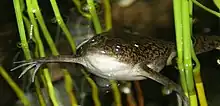platanna
English

The common platanna, Xenopus laevis
Etymology
(This etymology is missing or incomplete. Please add to it, or discuss it at the Etymology scriptorium.)
Noun
platanna (plural platannas)
- Any of several clawed frogs of the genus Xenopus which spend most of their time in water and rarely emerge onto land, especially the common platanna, Xenopus laevis.
- 1977, Douglas Hey, Water: Source of Life, Oxford University Press, pages 109–110:
- […] leading medical pathologist, Dr Louis P. Bosman, became so concerned at the depletion of the local platanna population that he petitioned the Provincial Administration to introduce protective legislation and to investigate the possibility of the artificial culture of these animals at the Jonkershoek Hatchery. […] For many years scientists observed that there was only one species of platanna, Xenopus laevis. Dr Walter Rose, who devoted many years of study to the amphibians of the Western Cape, had questioned this, and had eventually became convinced that there was another species, similar in appearance, but smaller, shyer and less aggressive. This he named X. gilli after Dr L. Gill, director of the South African Museum.
- 1990, Louis Liebenberg, A Field Guide to the Animal Tracks of Southern Africa, David Philip Publishers, page 81:
- Some frogs, like the Platanna (Xenopus laevis), are wholly aquatic, living, feeding and breeding under water.
- 2008, Rael Loon, Hidden Wonders: The Small 5005 of Southern Africa, Insects, Spiders, Frogs, Reptiles, Jacana Media, page 269:
- Platannas are found almost permanently in water and can remain submerged for hours without needing to surface.
Derived terms
- Cape platanna (Xenopus gilli)
- common platanna (Xenopus laevis)
- Gill's platanna (= Cape platanna)
- Fraser's platanna (Xenopus fraseri)
- Peter's platanna (Xenopus petersii)
Anagrams
This article is issued from Wiktionary. The text is licensed under Creative Commons - Attribution - Sharealike. Additional terms may apply for the media files.